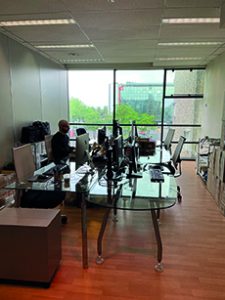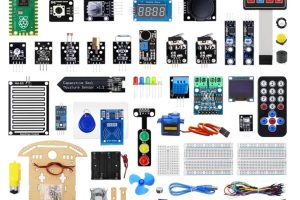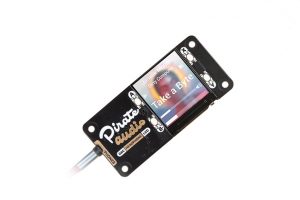 An early interest in the laws of nature, science and machinery meant that one of young Maria Chizzali’s favourite books was How Things Work, a mini encyclopaedia of basic science and engineering. She describes herself as a passionate reader,
An early interest in the laws of nature, science and machinery meant that one of young Maria Chizzali’s favourite books was How Things Work, a mini encyclopaedia of basic science and engineering. She describes herself as a passionate reader,
“I devoured books of science fiction, astronomy, and astrophysics. The passion for flying remained with me: today, I fly gliders and small motor planes.”
She was the first member of her family to attend university, studying electrical engineering, analogue and digital electronics, computer science at the University of Padua, followed by a Masters degree in engineering at the same university.
“I felt that a course of studies aimed at creating practical tools or products best matched my pragmatic nature,” she recalls. There she encountered some “outstanding” female lecturers, teaching some of the most challenging technical courses.
As a graduate, she did not experience many obstacles when she started her career with the IT consultancy Accenture. It was a multi-national company, where everyone was “too busy to waste energy on politics”, she says.
“When I moved to an industrial corporation, where I was one of two female managers in Europe and much younger than my male colleagues, I initially enticed some curiosity. Still, I was treated as a team member from that moment on. No one cut me any slack for being a woman, but no one doubted my ability to get things done.”
She says that, like everyone else, she had to “deal with the intricacies of corporate dynamics… no one spared me low blows because I was female”.
Her first role at Dell was to build the telephone sales team for its newly‑created Italian branch. It was Italy’s first direct telephone computer sales force and recruitment agencies struggled to find the right people.
Chizzali recommended that the search profile should be for ‘DJs’ – individuals who may be shy and a little awkward face-to-face, but who become bright, witty, and incredibly talented behind a microphone. “This way, we could hire incredible B2B professionals who have since made great careers.” It was as head of sales in various companies that she learnt to organise remote sales forces. She applies these skills today in the digital sales channels of both Hsyco and Sfera Labs.
Her ambition as an undergraduate was to pursue a career creating highly technological and quality services and products. Buoyed up by bosses she trusted as mentors, an inquisitive nature and the pleasures of learning new things, and with 20 years’ experience in multi‑national technology corporations, she had the opportunity to create Hsyco, developing security, safety and energy management industrial automation systems. The challenge was so rewarding that she did the same again in 2016, co-founding Sfera Labs, which designs, manufactures and sells servers, I/O modules and sensors for industrial automation based on open platforms.
Work-life balance
Any professional role entails responsibilities and commitment, reflects Chizzali. She has also had to deal with corporate dynamics, which can be tough, she concedes.
“Throughout my career, I learnt to be always well prepared to face those responsibilities and navigate the corporate world’s intricacies.
“I’ve always worked long hours, but I managed to raise a family by being creative and flexible. The seniority and reputation I earned during the first two decades of my career allowed me to make choices oriented toward my objectives of quality of life and work‑life balance.”
To build a satisfactory professional life requires many years of hard work and the courage always to put yourself on the line, pursue ever‑adapting goals without losing the curiosity and the ingenuity of the early days, she believes.
Hsyco was created when Chizzali and her husband (Ulderuci Arcidiaco, CEO of Hsyco and Sfera Labs) bought their first house: they wanted to fit it out with automated controls but found that there was no single, integrated graphical control interface. “So we did the next logical thing, and started developing our own integrated control system.”
They wanted to develop something hardware‑independent so that users could choose the field systems that were more suited to a project, with a graphical control interface (all before the advent of the iPod) and to include secure remote‑control functionality for use by two individuals who were both working full time and raising a family, she says.
In 2008, when the iPod was launched, Hsyco was the first control solution that worked on the new devices, says Chizzali, and this encouraged the pair to focus their efforts and build the company.
Recognising Raspberry Pi
The introduction of open platforms such as Arduino and Raspberry Pi prompted the creation of Sfera Labs.
 Encouraged by the success of the hardware independent development environment of Hsyco, they turned their attention to creating open automation. “In 2014, we dusted off our electrical engineering degrees and started designing the first Arduino-based I/O module, Arduino Uno, and the first Raspberry Pi-based server, the Strato Pi Base, and the rest is history,” she says.
Encouraged by the success of the hardware independent development environment of Hsyco, they turned their attention to creating open automation. “In 2014, we dusted off our electrical engineering degrees and started designing the first Arduino-based I/O module, Arduino Uno, and the first Raspberry Pi-based server, the Strato Pi Base, and the rest is history,” she says.
Chizzali and Arcidiaco teamed up with a computer engineer at Hsyco, Giampiero Baggiani, who is now Sfera Labs’ head of software development.
“Ulderico is the creative mind behind Sfera Labs’s technology. He still does most of the high-level design of our devices, while Giampiero works on the firmware development and testing processes design. My contribution is to the engineering part of the design since I’m in charge of manufacturing and operations,” explains Chizzali.
Family issues
All of this entrepreneurship was against the backdrop of family life. Their children are now adults, but when they were younger, Chizzali said that she, “like everyone else, was creative and became a talented juggler”.
She acknowledges the support of technology and a “fantastic part‑time nanny” in managing to be close to her children, both in person and when she was away. She helped with homework and school issues when the children were young, then later corrected university papers and helped to prepare them for job interviews.
“Being a parent helped me to put things in perspective, realigning priorities and assuming a more balanced approach to family and work‑related issues. Organisation and time management are also essential.” Chizzali says she is inspired by Voltaire’s principal not to focus on the urgent issues and risk forgetting the important ones.
Leadership qualities
For leadership in companies, she values empathy, strategic thinking, organisational skills and time management, which are, up to a point, innate qualities.
“I believe that the combination of the traits of the female and male personalities give a competitive edge to a company. For this to happen, women must have a voice in the organisation, which is also up to us.”
She thinks women are suited to careers in industrial automation or electronics engineering. Technical professions require precision, close attention to detail, neatness and organisation, she says.
“They also entail challenging study curricula and hard work. Most of those qualities are typical of a female personality. They, however, may sound scary to a young person. Girls, in particular, may feel intimidated by the male‑dominated environment and by walking an unfamiliar road.”
To encourage girls to consider technical professions, she would highlight “the excitement of discovery, of making things happen with your own hands, of being part of a team. There are fewer routine and repetitive tasks than in other fields.”
Future engineers
Chizzali thinks communicating these perks would help, via the teaching of coding in primary schools, and says on‑the‑job training of a young new hire is a significant investment for a company.
“I would increase incentives for companies hiring and training young people in technical fields. Technical schools and universities should focus their training on their course’s most up‑to‑date and practical aspects,” she adds, while calling for an increase in funding for non-profit organisations such as Coderdojo or the Raspberry Pi Foundation, which are dedicated to spreading computer literacy.
She also advocates international exchanges for young people, both as students and as workers in the early stages of their careers. “I’m worried about the barriers that countries have put up in the past few years, and I’m hoping they will soon understand that young talents with international experience are an asset they should nurture and value.”
To retain new entrants and young women in particular to stay in technical careers, she believes clear job progression paths and good salaries are key. “In my experience, young people leave technical careers because they don’t feel rewarded in terms of professional growth and economic recognition. Technical people are often afraid of ending up in a position where they don’t learn anything new.”
She observes that conventionally, pay is higher in other sectors, but this is changing. “It is not easy to modify established market models. However, in the past few years, the exponential growth in the demand for skilled technical professionals is starting to reverse this trend, giving good hopes for the future.”
Chizzali’s advice for starting a technology company is to exploit networks. A young engineer may have the brightest ideas, but will usually lack the experience to manage non-technical aspects, such as finance and sales, or procurement and manufacturing.
“Unfortunately, start‑up companies often don’t have the resources to hire experienced professionals. Being part of a network of expertise could be the solution, even better if composed of other start‑up companies covering all the facets of a business enterprise.”
 Electronics Weekly Electronics Design & Components Tech News
Electronics Weekly Electronics Design & Components Tech News



